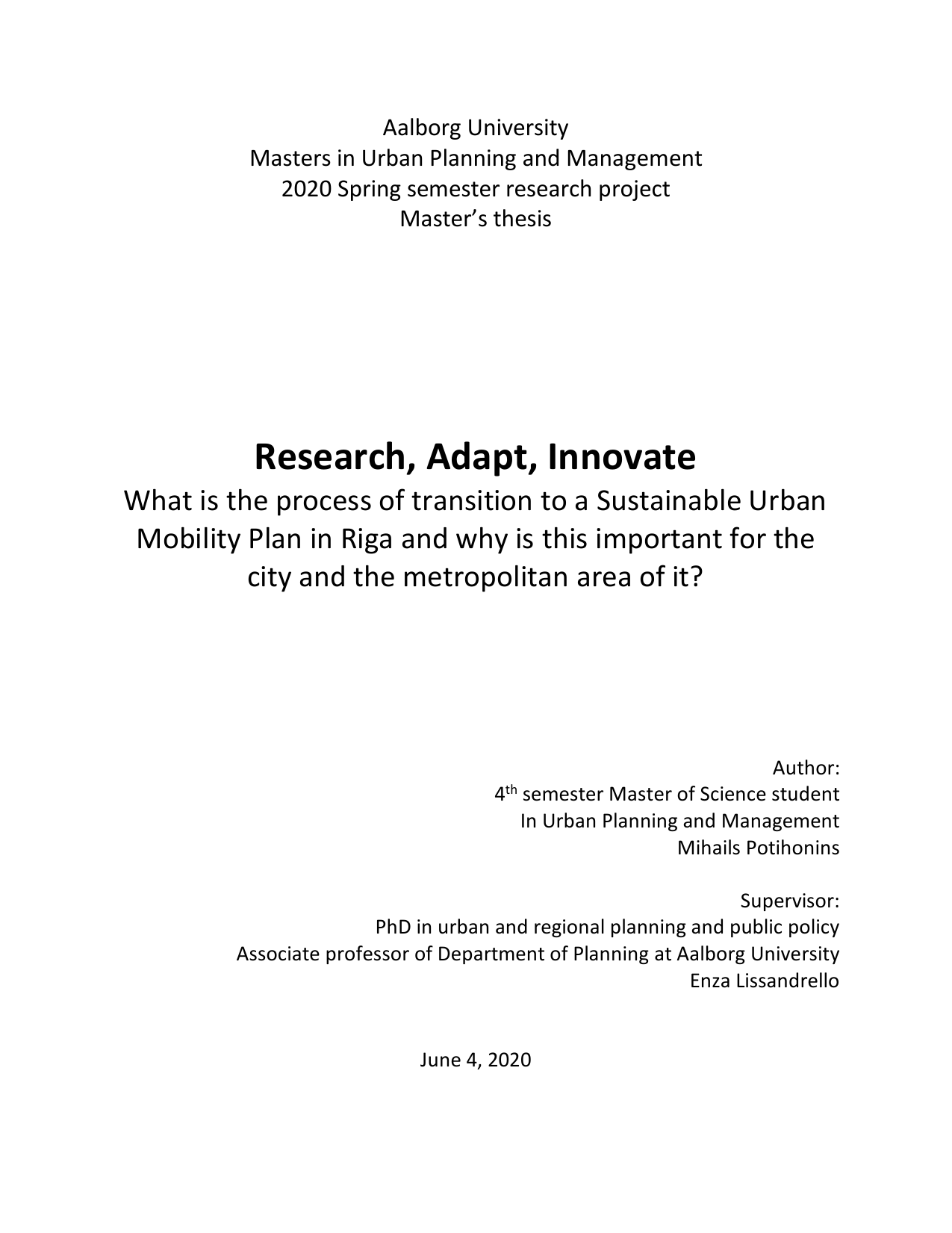
Research, Adapt, Innovate: What is the process of transition to a Sustainable Urban Mobility Plan in Riga and why is this important for the city and the metropolitan area of it?
Author
Term
4. Term
Publication year
2020
Submitted on
2020-06-04
Pages
81
Abstract
Nowadays, there is an ongoing transition to sustainable urban mobility facilitated in many European municipalities to develop alternative methods for car-based planning paradigm. Although cities tend to develop their own definition of the ‘sustainable urban mobility’ and methods and tools of planning, measuring and assessing it, there are collective practices and approaches such as Sustainable Urban Mobility Plan (SUMP) communicated on the mega-regional level in the European Union. Bureaucracy, lack of communication, the pressure of unconsolidated political vision, insufficient theoretical investigation and practical use of tools to measure mobility along several other factors are constantly challenging public sector mobility planning institution in the question of what needs to be done to implement a fully functional Sustainable Urban Mobility Plan. The main aim of this research is to investigate what is the process of transition to a Sustainable Urban Mobility Plan in Riga and how can the process of transition be handled in the future. Theoretical knowledge on the changes in socio-technical regime viewed in multi-level perspective, as well as practices and guidelines from European planning documents and projects, are retrieved through analysing planning documents to build the framework for what creates a sustainable urban mobility system. The city of Riga is taken as an empirical case study to assess the current state of the mobility monitoring system in transition. Obstacles and barriers of improving the urban mobility system, are investigated through document and analysis, brief statistical overview and two e-mail interviews of actors involved in the planning process. The report draws to investigate to the most part the documents of the current long-term (until 2030) and medium-term (2014-2020 and 2019-2025) planning periods. The outcomes of this report suggest a form of recommendation to Riga Municipality for further monitoring sustainable urban mobility policy development based on the results of the analysis and the potential benefits of it mentioned in the discussion chapter.
Nowadays, there is an ongoing transition to sustainable urban mobility facilitated in many European municipalities to develop alternative methods for car-based planning paradigm. Although cities tend to develop their own definition of the ‘sustainable urban mobility’ and methods and tools of planning, measuring and assessing it, there are collective practices and approaches such as Sustainable Urban Mobility Plan (SUMP) communicated on the mega-regional level in the European Union. Bureaucracy, lack of communication, the pressure of unconsolidated political vision, insufficient theoretical investigation and practical use of tools to measure mobility along several other factors are constantly challenging public sector mobility planning institution in the question of what needs to be done to implement a fully functional Sustainable Urban Mobility Plan. The main aim of this research is to investigate what is the process of transition to a Sustainable Urban Mobility Plan in Riga and how can the process of transition be handled in the future. Theoretical knowledge on the changes in socio-technical regime viewed in multi-level perspective, as well as practices and guidelines from European planning documents and projects, are retrieved through analysing planning documents to build the framework for what creates a sustainable urban mobility system. The city of Riga is taken as an empirical case study to assess the current state of the mobility monitoring system in transition. Obstacles and barriers of improving the urban mobility system, are investigated through document and analysis, brief statistical overview and two e-mail interviews of actors involved in the planning process. The report draws to investigate to the most part the documents of the current long-term (until 2030) and medium-term (2014-2020 and 2019-2025) planning periods. The outcomes of this report suggest a form of recommendation to Riga Municipality for further monitoring sustainable urban mobility policy development based on the results of the analysis and the potential benefits of it mentioned in the discussion chapter.
Keywords
Documents
